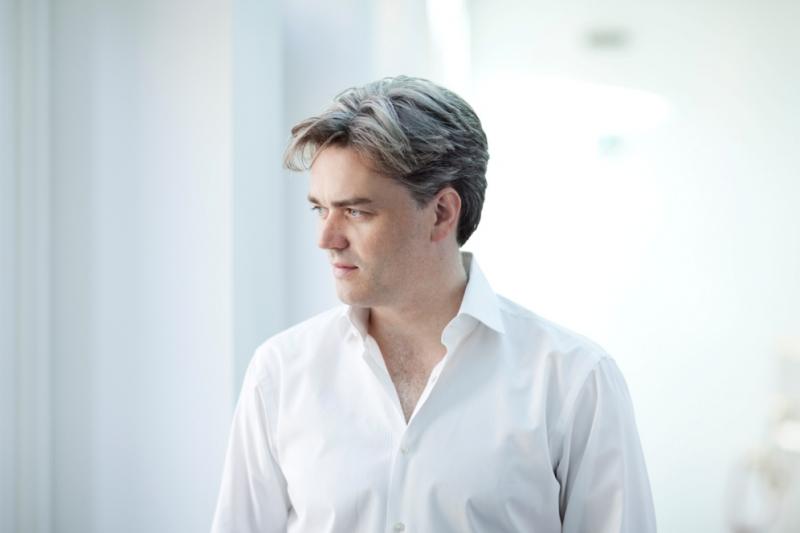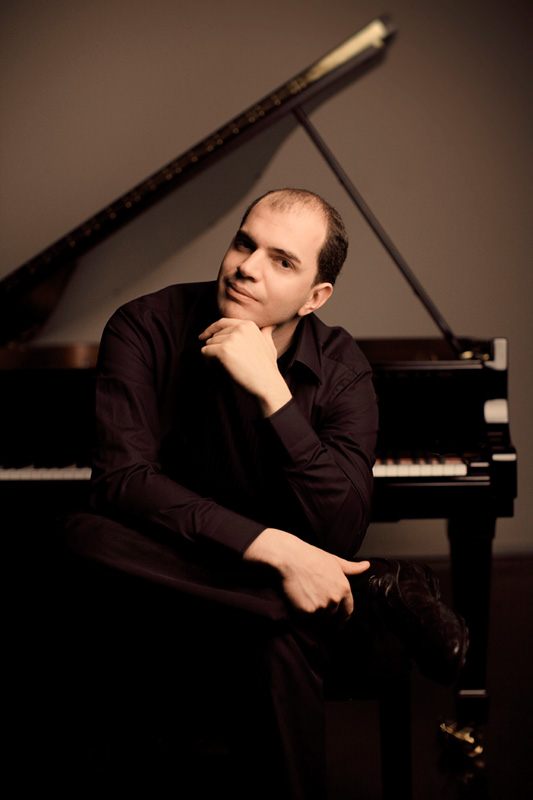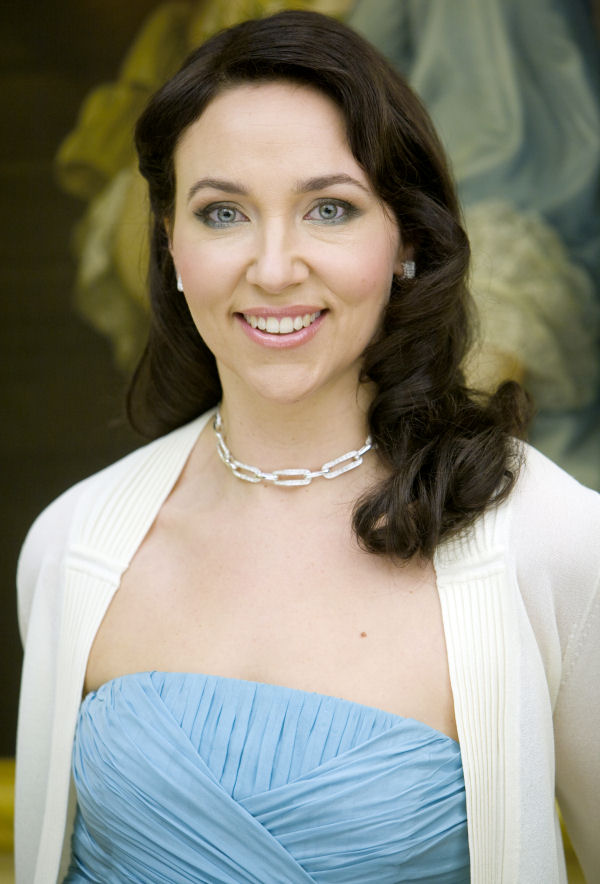Gerstein, Philharmonia Orchestra, Gardner, Royal Festival Hall | reviews, news & interviews
Gerstein, Philharmonia Orchestra, Gardner, Royal Festival Hall
Gerstein, Philharmonia Orchestra, Gardner, Royal Festival Hall
Flawless programme of lighter Shostakovich, ambiguous Britten and a cinematic score by his teacher Bridge

You don’t have to live under a totalitarian regime to write music of profound anguish. I was driven to argue the point at a Shostakovich symposium when an audience quizzer took issue with my assertion that Britten could go just as deep as the Russian.
Many of us in the Festival Hall would probably have agreed with young Benjamin when he wrote that The Sea “pleases me enormously – although it’s not as interesting as [Bridge’s] later stuff.” These marine oils, sometimes thickly applied, don’t quite sail out from under the shadows of Wagner and Debussy – though it was only 1910, after all. Bridge has a hand of beautifully wrought melodic cards, and if he doesn’t always know what to do with them, they tide us over until a storm that’s not a patch on the Mahlerian thrash to come in Grimes.
 Gardner seemed to be going for the film-score effect as surely as Hollywood-crazy John Wilson. The billowing strings were nicely set up by those wonderful passages for the violas near the beginning; the woodwind flecked us with sea-foam in the only movement that isn’t just a bit too long for its material; and the flute wrought moonshine with as heartaching a melody as Britten’s later, short-lived moment of calm in the midst of operatic crisis.
Gardner seemed to be going for the film-score effect as surely as Hollywood-crazy John Wilson. The billowing strings were nicely set up by those wonderful passages for the violas near the beginning; the woodwind flecked us with sea-foam in the only movement that isn’t just a bit too long for its material; and the flute wrought moonshine with as heartaching a melody as Britten’s later, short-lived moment of calm in the midst of operatic crisis.
The cinemascope lushness was nicely offset by crisp high jinks in the Shostakovich concerto. Kirill Gerstein (pictured right by Marco Borggreve) has played probably more chamber music than solo concerto roles, so he knew to give the pawky players at the start their due, shocking us in the gear change from modest single octaves to roaring double in a first-movement development which seems to bare the fangs of the Tenth Symphony’s whirlwind scherzo. A cool touch helped with the surprisingly nostalgic classic-romantic melody of the Andante, and the finale’s intoxicating piano etudes between lurching dances were as exhilarating as they can be: perfection, in short.
Perfect, too, were the three soloists in Britten’s oddball anthology of weird spring poems. Allan Clayton waxes brighter every time I hear him; there’s all the sensitivity and none of the vocal limitations of the Bostridge manner to his clear, intelligent articulation. Susan Gritton was the pretty May Queen with point, but the heart and soul of the piece belonged to mezzo Christine Rice (pictured below by Rob Moore). Fresh from her stunning Ariadne in Birtwistle’s The Minotaur, she brought a classical poise that was all the more affecting for its restraint to Britten’s selective setting of the poem I love most, Auden’s “A Summer Night”; the explosion of conflict from eastern Europe into the enchanted English June night-picture came as all the greater a shock.
 And how Britten colours this – woodwind only throughout, alto flute and bass clarinet hinting at the canker in the rose as surely as they do in The Rape of Lucretia and The Turn of the Screw. His scoring is selective and deliciously perverse: marauding bands of brass and creepy-crawly, Stravinsky Rite-like woodwind in the stone-cold introduction, trumpet cuckoos, violins only in spring showers and a cowhorn cutting through the set-up of the riotous finale.
And how Britten colours this – woodwind only throughout, alto flute and bass clarinet hinting at the canker in the rose as surely as they do in The Rape of Lucretia and The Turn of the Screw. His scoring is selective and deliciously perverse: marauding bands of brass and creepy-crawly, Stravinsky Rite-like woodwind in the stone-cold introduction, trumpet cuckoos, violins only in spring showers and a cowhorn cutting through the set-up of the riotous finale.
Gardner polished and honed all this unflappably. There was much spine-tingling delivery of the amazing choral writing from the glorious Birmingham choirs Gardner brought with him from an earlier performance of the Spring Symphony there last month: not just the CBSO’s adult forces but a panoply of children – mostly girls, it has to be said – for the unforgettably cheeky numbers, whistling and all. As the finale’s rollicking waltz was joined by “Sumer is icumen in”, the light was blinding, if you’ll forgive mixed metaphors. Gardner has already shown us what a master conductor of Britten he is with the ENO Grimes; here he proved that this quirky anthology is just as much of a masterpiece in its own lopsided way.
- Ashkenazy conducts the next Philharmonia concert, of Britten and Shostakovich, at the RFH on Thursday 21 February
- Read David Nice's blog, I'll Think of Something Later
rating
Explore topics
Share this article
Add comment
The future of Arts Journalism
You can stop theartsdesk.com closing!
We urgently need financing to survive. Our fundraising drive has thus far raised £49,000 but we need to reach £100,000 or we will be forced to close. Please contribute here: https://gofund.me/c3f6033d
And if you can forward this information to anyone who might assist, we’d be grateful.

Subscribe to theartsdesk.com
Thank you for continuing to read our work on theartsdesk.com. For unlimited access to every article in its entirety, including our archive of more than 15,000 pieces, we're asking for £5 per month or £40 per year. We feel it's a very good deal, and hope you do too.
To take a subscription now simply click here.
And if you're looking for that extra gift for a friend or family member, why not treat them to a theartsdesk.com gift subscription?
more Classical music
 First Person: Manchester Camerata's Head of Artistic Planning Clara Marshall Cawley on questioning the status quo
Five days of free events with all sorts of audiences around Manchester starts tomorrow
First Person: Manchester Camerata's Head of Artistic Planning Clara Marshall Cawley on questioning the status quo
Five days of free events with all sorts of audiences around Manchester starts tomorrow
 Goldscheider, Brother Tree Sound, Kings Place review - music of hope from a young composer
Unusual combination of horn, strings and electronics makes for some intriguing listening
Goldscheider, Brother Tree Sound, Kings Place review - music of hope from a young composer
Unusual combination of horn, strings and electronics makes for some intriguing listening
 theartsdesk Q&A: composer Donghoon Shin on his new concerto for pianist Seong-Jin Cho
Classical music makes its debut at London's K-Music Festival
theartsdesk Q&A: composer Donghoon Shin on his new concerto for pianist Seong-Jin Cho
Classical music makes its debut at London's K-Music Festival
 Helleur-Simcock, Hallé, Wong, Bridgewater Hall, Manchester review - moving lyricism in Elgar’s concerto
Season opener brings lyrical beauty, crisp confidence and a proper Romantic wallow
Helleur-Simcock, Hallé, Wong, Bridgewater Hall, Manchester review - moving lyricism in Elgar’s concerto
Season opener brings lyrical beauty, crisp confidence and a proper Romantic wallow
 Kohout, Spence, Braun, Manchester Camerata, Huth, RNCM, Manchester review - joy, insight, imagination and unanimity
Celebration of the past with stars of the future at the Royal Northern College
Kohout, Spence, Braun, Manchester Camerata, Huth, RNCM, Manchester review - joy, insight, imagination and unanimity
Celebration of the past with stars of the future at the Royal Northern College
 Jansen, LSO, Pappano, Barbican review - profound and bracing emotional workouts
Great soloist, conductor and orchestra take Britten and Shostakovich to the edge
Jansen, LSO, Pappano, Barbican review - profound and bracing emotional workouts
Great soloist, conductor and orchestra take Britten and Shostakovich to the edge
 Jakub Hrůša and Friends in Concert, Royal Opera review - fleshcreep in two uneven halves
Bartók kept short, and a sprawling Dvořák choral ballad done as well as it could be
Jakub Hrůša and Friends in Concert, Royal Opera review - fleshcreep in two uneven halves
Bartók kept short, and a sprawling Dvořák choral ballad done as well as it could be
 Hadelich, BBC Philharmonic, Storgårds, Bridgewater Hall, Manchester review - youth, fate and pain
Prokofiev in the hands of a fine violinist has surely never sounded better
Hadelich, BBC Philharmonic, Storgårds, Bridgewater Hall, Manchester review - youth, fate and pain
Prokofiev in the hands of a fine violinist has surely never sounded better
 Monteverdi Choir, ORR, Heras-Casado, St Martin-in-the-Fields review - flames of joy and sorrow
First-rate soloists, choir and orchestra unite in a blazing Mozart Requiem
Monteverdi Choir, ORR, Heras-Casado, St Martin-in-the-Fields review - flames of joy and sorrow
First-rate soloists, choir and orchestra unite in a blazing Mozart Requiem
 Cho, LSO, Pappano, Barbican review - finely-focused stormy weather
Chameleonic Seong-Jin Cho is a match for the fine-tuning of the LSO’s Chief Conductor
Cho, LSO, Pappano, Barbican review - finely-focused stormy weather
Chameleonic Seong-Jin Cho is a match for the fine-tuning of the LSO’s Chief Conductor
 Classical CDs: Shrouds, silhouettes and superstition
Cello concertos, choral collections and a stunning tribute to a contemporary giant
Classical CDs: Shrouds, silhouettes and superstition
Cello concertos, choral collections and a stunning tribute to a contemporary giant
 Appl, Levickis, Wigmore Hall review - fun to the fore in cabaret and show songs
A relaxed evening of light-hearted fare, with the accordion offering unusual colours
Appl, Levickis, Wigmore Hall review - fun to the fore in cabaret and show songs
A relaxed evening of light-hearted fare, with the accordion offering unusual colours

Comments
This was nowhere near his